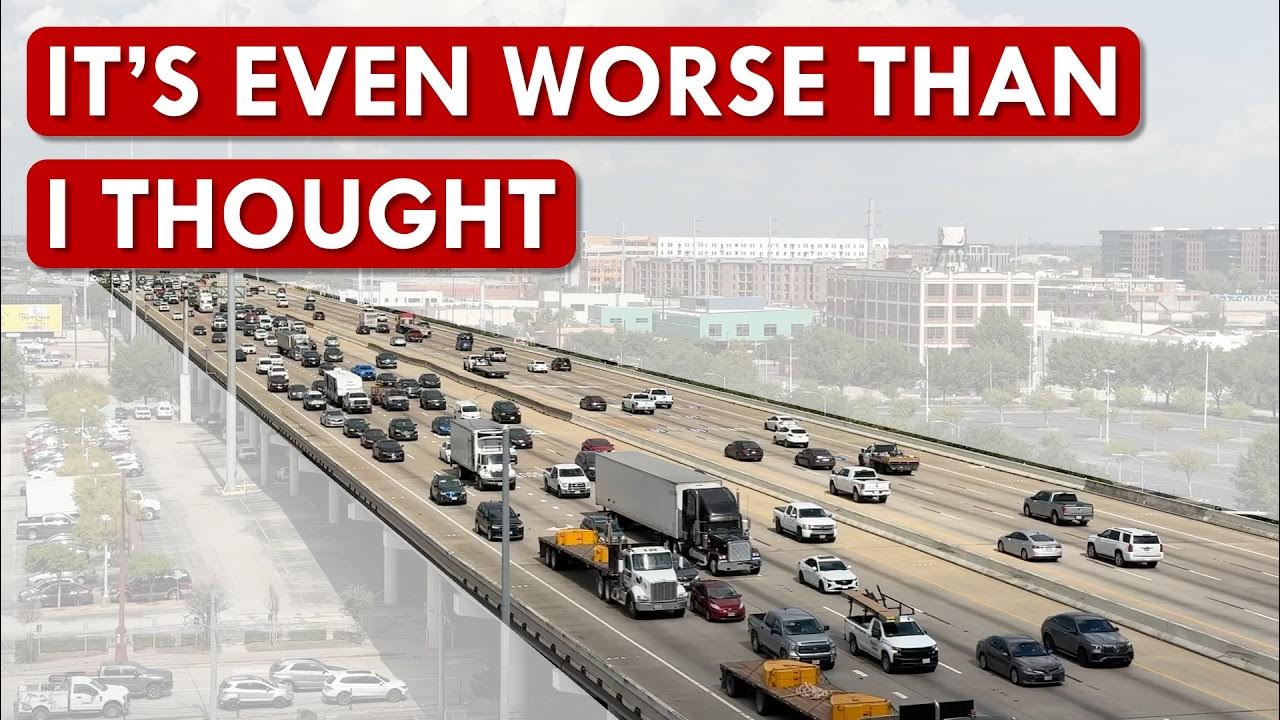Good videos with some very good insights.
I normally only counted my own personal costs and those were already quite high for driving vs public transport where it was available. I think if most drivers use an app to count all their personal costs they might already be lenient towards more public transport.
This one though is very abstract and will be very difficult to convince the normal driver. But if you look at that cost per mile, it is much worse than the own personal cost per mile.
Why calculate my costs per mile if I don’t have any alternatives? It costs me what it costs.
The video isn’t your cost per mile. It is the cost per mile on society as a whole per mode of transport
-
Multiple peoples cost per mile should be aggregated to open up alternatives.
-
Even if you only have one method of transportation, the distance you travel is still elastic.
-
It’s what it costs you now, and you don’t have alternatives now.
Maybe this will help you think about the future differently: be it planning to move or getting a different job so that you can use alternative transport, making smaller changes that would allow you to not use a car as much, or even long-term decisions like championing for change at the legislative level that might aid development of better transportation access.
Ii have no plans to move or change jobs anytime soon for various reasons. My area is very conservative, the only thing well-funded is police. Non-car infrastructure is a low priority, I’m very aware of the politics here. My best efforts are at state or national level even though things like bike lanes are generally decided locally. There just isn’t enough political energy to get them to spend the billions we’d need to widen all the roads.
Removed by mod
Cars are fucking terrible for the economy.
Possible productive hours are wasted with long commutes, because driving takes effort and work.
They caused us to build urban areas spread out in a density that is not self sustaining.
Its horrible for the environment, and climate change is gonna be absolutely great for the economy in the next decades. /s
Not too mention all the money and engineerimg that went into the technology of ICE cars that’s now obsolete.
They caused us to build urban areas spread out in a density that is not self sustaining.
I’ve never really understood this argument. Depending on population density, agriculture needs 5 to 50 times as much space to feed a city as the city itself actually occupies.
Renewable energy sources (Solar, wind, hydro) also require very large areas of land compared to similar production from legacy plants.
Sewage processing also requires massive land areas. Most major cities use processing facilities that discharge into major waterways; rural areas basically use it to feed their own lawns.
When you need all that space anyway, it seems rather wasteful to concentrate all the people into a tiny fraction of it.
The only people who really benefit from our obscene levels of urbanization are landlords.
Ah I understand, let me be more specific, and answer some questions.
When it comes to farming, we don’t put farmland in cities, in rural areas cars do make sense.
Energy generation doesn’t have to be done in cities either.
As for sewage, yeah it takes up space in cities because you can’t tranport it out, but it’s small compared to the entire city.
The parts that are unsustainable are the vast swaths of single family homes.
The maintenance costs for these areas, in the form of electcity, water, sewage, roads, are higher than the tax revenues generated by property taxes.
It takes a long time for this tax deficit to show, about 30ish years, and it can be delayed by builidng and developing new suburbs. The taxes from the sales and other newness generate some new income. The federal government will also subsidizie a lot a building a new road, but notably not maintaing them. Which after 30 years can be more than the road would cost to build new!
But after a while the maintenance comes due, roads fill with potholes and need replacing, sewer and water pipes start leaking due to wear, or even the ground moving. Electricity lines blow over, knocked by trees, or hit by drivers need to be fixed.
The cost of roads and car dependency is not cheap. A study came out that it costs Americans an average of $20k a year for car dependency. About half that is owning a car, and the other half is taxes spent on road infrastructure.
In just slightly denser areas, where the government hadn’t regulated things like setbacks, minimum parking requirements, and soley single family housing, there is enough revenue.
So what ends up happening is these denser areas subsidizie car dependent suburbs.
And all the while suburbs with car only transportation have tons of traffic, because when you get down to it, a single lane of cars just can’t move that many people.
Now there are some exceptions to this. I live in an area with astonishingpy high property values, nearing 1 million for a normal house. This generates a lot of revenue, but it creates an housing affordability problem. This problem would be alleviated if there was increased density if the local government didn’t zone 84% of the land into single family housing only.
And it would still increase tax revenues in my area.
And not to mention the massive ongoing subsidies needed to provide the infrastructure and deal with the externalities. If anyone is craving a state-interventionist communist lifestyle, it’s our friend above
Drunkenly read cats and came in here ready to fight
Funny, though, that they don’t differentiate between “cars” and “trucks”. The big costs, e.g. for road maintenance, are due to trucks by a wide margin (The relation between vehicle weight and road damage is a x⁴ one!). And while this community would love to see all cars gone, there is no real alternative for trucks at the moment - at least as long people want a well-stocked supermarket, restaurant, or boutique within bike range. Erasing all personal cars from those cost calculations would hardly affect the overall costs. In the end, most of the costs for roads are a basically just a subsidy for the logistics industry. If they had to pay for road keepup themselves, prices everywhere would simply rise.
Please stop being disingenuous. You know perfectly well that what we want is doable because it is already being done in many places in Europe and Japan. Stop fighting a strawman of your own creation.
We want fewer private motor vehicles in our streets because car-centric urban planning translates into places that are unpleasant to live in, especially for people who don’t drive.
I live right by a busy stroad. How many of the cars whizzing by do you think are delivery vehicles? How many busses? Very few compared to the number obese SUVs and lifted pickups, even though there are four large supermarkets and many shops within walking distance along this corridor.
If we reduced the number of private motor vehicles in this stroad the quality of life for my family would significantly increase: less air pollution, less traffic noise, more pleasant daily errands, less risk of being run over by a tank-sized ego booster, more room for trees and bicycles.
Stop spewing bullshit and fear. Let my kids and I hope for a better future.
I never said it was not doable. I just made it clear that making personal cars somehow “vanish” will not really change the financial side of things.
I’m not against change. On the contrary. But I know that just wishing won’t help. One needs a realistic goal, and find an equally realistic way to get there. Anything else is just dreaming. Just saying “Cars have to vanish” won’t accomplish anything.
I wish anyone in this “FuckCars” community would actually think of a way to fix the world, and not just complain about the way it is.
I just made it clear that making personal cars somehow “vanish” will not really change the financial side of things.
What you are not taking into account is that the sort of low-density, car-dependent, single family home suburbia we criticise requires many more square meters of road per person than a walkable medium-density mixed-use neighborhood. Strongtowns shows with data, not opinion, how town centers are subsidizing financially unsustainable car-dependent suburbia.
I wish anyone in this “FuckCars” community would actually think of a way to fix the world, and not just complain about the way it is.
Easy. Start by copying the Dutch street design guidelines and zoning laws. Boom! Living car-free or car-lite would be much easier, at least in North America where so many people drive to do the most basic daily errands.
We don’t need to reinvent the wheel, just study and copy what already works elsewhere. That’s how bad things are around here.
Looks like you’ve never been in a town in the Netherlands. I’ve been, many times, and it’s not all roses. Yes, they are often better for bikers, but overall, they are traffic nightmares.
The low-density housing situation is an American problem that we don’t have. We, on the other side, have cities grown for thousands of years, and nobody thought of leaving space for people, bikes, and public transport. So we usually try to protect the weakest (the pedestrians) by giving them a safe space (unless violated by bikers), and the streets have to be shared, simply because there is no space. Yes, you can wish for all cars to vanish there, but it is not realistic. Just like wishing your suburbans away.
I spent a couple of decades living in Spain. I’m well familiar with old towns.
Designing our streets for pedestrians first, transit/bikes next and private motor vehicles last is the way it should be. If that means that some streets are inconvenient for car traffic, so be it. Surely that is preferable to downgrading the ability of the most vulnerable to move around, or the quality of that experience.
North-american style car-dependent suburbs are an aberration that should disappear altogether. They didn’t exist a hundred years ago and they shouldn’t exist now. It is immoral that the people living sustainably in urban centers are subsidizing the people living at large in the suburbs. If they like them so much they can pay their true cost to society.
Designing our streets for pedestrians first, transit/bikes next and private motor vehicles last is the way it should be.
Nobody designed them the way they are, at least not with a grand design in mind. Traffic is shaped by planning for existing demand. To change planning, you need to change the demand first. Working against demand won’t get you anywhere, at least not in politics, and they are holding the purse strings.
North-american style car-dependent suburbs are an aberration that should disappear altogether.
While it is not wrong, as long as you don’t have a credible idea why millions of people should give up their homes to live in overpriced shoe boxes without a bit of green and quiet in the city, this will get you nowhere. People love living in spaceous houses they own. People love having some green around them. People love the quiet. And first of all, people love not having to deal with all the other city problems.
It is immoral that the people living sustainably in urban centers are subsidizing the people living at large in the suburbs.
Remember that those urban centers would and could simply not exist without people from the outskirts working and shopping in those urban centers. The dependency is definitely not one-sided.
Nobody designed them the way they are, at least not with a grand design in mind. Traffic is shaped by planning for existing demand
That is not how it works, at all. They model future demand and they do make executive decisions to shape traffic in the way they want it to be, not just the way it is today.
as long as you don’t have a credible idea why millions of people should give up their homes to live in overpriced shoe boxes without a bit of green and quiet in the city, this will get you nowhere
That is happening because:
- The rest of us are subsidizing their lifestyle through our taxes. North American suburbs don’t pay enough to cover their own infrastructure.
- They do not experience the externalities of their lifestyle. It is us living in denser areas that suffer from the increased motor vehicle traffic that suburbanites produce.
- Ever increasing car traffic has led to widening roads and culling of trees. Eliminate car lanes and plant trees, I say.
- Cities aren’t loud, cars are loud. Reduce car traffic and our streets won’t be noisy.
People love living in spaceous houses they own.
They don’t love it so much when they have to pay for the cost of the infrastructure needed to support them. Stop subsidizing suburbs and suddenly people will be much more accepting of more modest accommodations, like most of us do.
Remember that those urban centers would and could simply not exist without people from the outskirts working and shopping in those urban centers.
Plainly false, as those suburbanites could simply move closer to where they work, if only zoning laws permitted them to do so, which is not the case in most of North America.
Again, and it is a point that no amount of mental yoga can get around: what we want is something that already happens in plenty of towns around Europe and Japan that existed before the advent of the car. It is not unrealistic, it is the historical norm.
He talks about the externality cost of traffic on goods in the video “one Uber eats delivery can hold up $14 million in semi conductors”.
It’s the orange bar on the graph.
Of course roads are a subsidy for logistics, they have been for at least 7000 years. The importance of moving goods highlights the importance of removing personal vehicles.
there is no real alternative for trucks at the moment
Yeah, I’m afreight there’s railly no alternative way to trainsport things.
You want to turn every other street in a town into a railyard? Good luck with that plan. And do you really want to cross rails with your bike at every corner? I can tell you, riding a bike in a tram-ridden part of town is no fun.
Yes, you definitely need to turn every street in town into rails in order to replace over-the-road trucking. That is 100%$ how it works.
OK, tell the world your plan. at least I am listening.
Pretty much just eliminate OTR trucking in favor of rail. Mostly eliminate heavy trucks in towns, in favor of smaller box trucks.
You do realize the amount of extra track and train, you would need to offset the use of freight trucks on highways don’t you, let alone the increase in smaller box trucks as well.?
I am simplifying a little but that is how the trucking industry started because rail was not able to keep up with demand for goods logistics.
Pretty sure it’s because we stopped investing in rail and started subsidizing trucking instead.
You do realize that rail is vastly more effecient to move goods than frieght trucks don’t you?
I was not asking about political handwaving. When you dismissed tram tracks in every street, I expected something more substantial as an alternative.
They would rise but not uniformly esp if we could charge accurately. So we would start to penalise the more destructive models and encourage lower transport choices.
Smaller trucks would mean more drivers (which are already hard to find). More drivers mean more costs. You would basically penalized logistic companies either way just for them to do their job: Bringing goods into the cities.
Someone else suggested to go by rails. Hardly feasable, as one would have to turn half the cities into railyards. And any kind of train can only operate efficiently because of sheer size. Which means: problems with small curve radiuses. Which an inner city most likely will have to have, unless you only fit the major roads, and move the goods for the last few hundred meters by whatever means.
There is a shitload of catch 22’s in this whole story - cities evolved to what they are and how they worked over a long time, and changing them will cause mega efforts.
The big costs, e.g. for road maintenance, are due to trucks by a wide margin
The big costs are due to weathering. The freeze-thaw cycle in particular does a huge amount of damage to roads.
The costs of fixing freeze-thaw damage to roads is proportional to the total paved lane miles you have. If you’ve got a total of 5 lanes on your stroad, that’s 2.5x more damage to repair than if you’ve just got 2 lanes on your street.
And car lanes don’t move many people per hour per foot of road width. Bike lanes, sidewalks, and bus lanes support much higher numbers of people per hour per foot of lane width.
Having people drive everywhere encourages suburban sprawl with a very large number of lane miles per capita. That has a very expensive fixed cost to repair from normal freeze-thaw cycles, even if the marginal cost of each mile actually driven in a car isn’t so bad.





